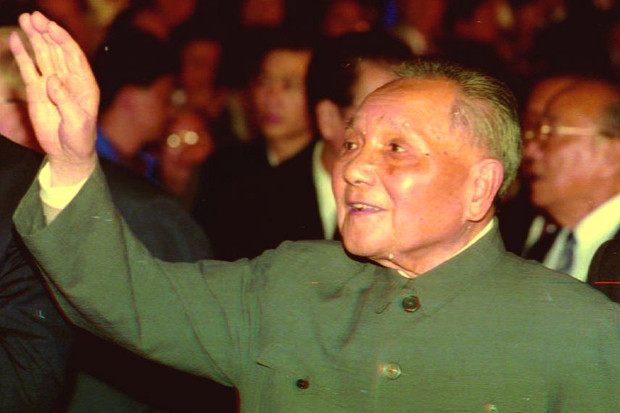Much has been written about Deng Xiao-ping (1904–1997), most recently by Ezra Vogel in Deng Xiaoping and the Transformation of China. But apart from his fondness for eating croissants and playing bridge, and the fact that his second wife left him for a party colleague — Michael Dillon records the divorce only — we still know little about Deng himself. Mao Zedong’s personality, on the other hand, was often remarked on — from Edgar Snow’s first meeting with him in 1936 to Henry Kissinger’s in 1971(both men swooned in his presence).
Dillon rightly notes that Vogel compressed a large part of Deng’s life into a mere 30 pages. In this biography the entire life and career are given appropriate space. Unfortunately, however, what the author does, with a few exceptions, is to excuse or explain away Deng’s record as a violent disciple of Mao, resorting to evasive words like ‘probably’, ‘possibly’ and ‘perhaps’.
We get the standard account of Deng’s upbringing in a small landlord’s family, his five years in France, where he joined the fledgling Chinese communist party, a year or so of Stalinist buffing in Moscow, and then back to China, where Zhou Enlai, who had also been in France, guided Deng up the greasy party pole and rescued him from the purges always lurking near party members.
Deng’s lifelong loyalty to Mao, which Dillon uses to explain why the former chose this road rather than that one, enabled him to climb ever higher, to a vice premiership and a move to Beijing in 1952. But it was in that very period (ignored by Dillon) that Deng (and Zhou) exhibited the ruthlessness that Mao always appreciated in those close to him. Frank Dikötter, in The Tragedy of Liberation, a detailed analysis of Mao’s first decade in power (not listed in Dillon’s bibliography), has this to say:
Nobody merely acted under orders, as leaders created their own guidelines, trying to guess what was required of them … Deng Xiaoping, for instance, suggested in February 1951 that between half and two-thirds of all counter-revolutionaries be executed. Mao approved, on condition that the killings be ‘secretly controlled, without disorder or mistakes.’
Between 1959 and 1962 China suffered the worst famine in world history, in which 30–50 million people starved to death — a figure Dillon mentions only in passing. The high-ranking Marshal Peng Dehuai was purged when he publicly attacked Mao for ignoring this super-tragedy — one which the chairman’s own comrades knew he had caused. Deng said nothing because ‘he did not want to be involved in such a high-profile conflict, knowing that Mao would win’.
Dillon describes how, during this period, when starving Chinese were eating the dead, Deng visited a small city where he urged that production ‘had to be increased’, and in a factory noted that some metalwork ‘had not been properly polished’. He was, Dillon observes, ‘steering clear of ideological disputes’ and ‘acting on the basis of what he saw as the practical needs of the country’. Which, in a nutshell, meant staying away from the disaster.
In 1989 during the Tiananmen demonstrations and eventual massacre (which I witnessed) Deng, by then officially retired, remained at the centre of power, along with other ‘elders’, whose attitude towards calls for democracy was savage repression. But Dillon describes Deng as being ‘manipulated’ by men who held the highest positions, although he himself had already sacked two of his old comrades, the party leader Hu Yaobang and his successor Zhao Ziyang, for urging patience with the rising calls for human rights and democracy.
As regards the Tiananmen Papers, a collection of high-level documents smuggled out of China showing Deng’s central role in the crackdown, Dillon treats them as questionable, partly because the American editors noted they were difficult to assemble. He ignores Deng’s on-the-record speech to the army a few days after the killings in which he congratulated the soldiers for having behaved ‘very well’, and famously said: ‘This had to happen.’
On Deng’s role as a champion of sweeping economic reforms, Dillon notes that he had to ‘transcend the limitations of his upbringing and early career’ and assimilate ‘a new world view and a new way forward for China’. What he really did was to let peasants get on with their skills at making a bit of money; but they remain poor compared to party officials.
In a final page peppered with his usual perhapses, Dillon observes that, during Tiananmen, Deng ‘may have come to the wrong decision for what he felt were the right reasons’. He concludes (as though the truth were unknowable): ‘Whatever the truth, Deng will always be associated personally with China’s most public episode of repression.’ It did, after all, take place near his front door.






Comments